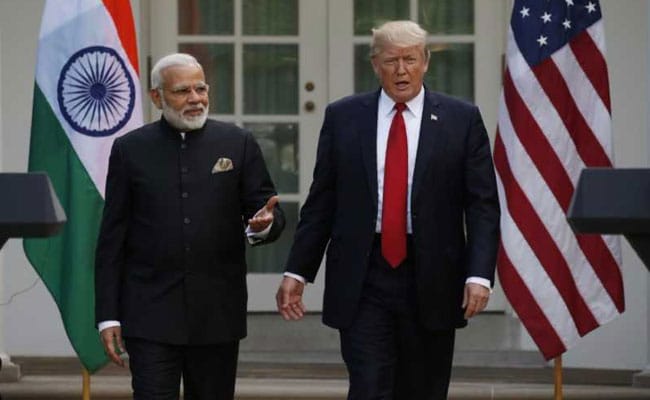
In new US security policy, Trump administration says "will deepen strategic partnership with India"
Washington:
Describing India as a "leading global power" in its newly unveiled National Security Strategy, the Trump administration said it will deepen US' strategic partnership with India and support its leadership role in maintaining security in the Indo-Pacific region.
The 68-page document said the United States will seek to increase quadrilateral cooperation with India, Japan, Australia.
"We welcome India's emergence as a leading global power and stronger strategic and defence partner," said the National Security Strategy unveiled by President Donald Trump yesterday.
"We will expand our defence and security cooperation with India, a Major Defence Partner of the United States, and support India's growing relationships throughout the region," the NSS said speaking about the Indo-Pacific region.
India responded by saying that it appreciated the strategic importance given to bilateral ties by the United States.
"As two responsible democracies, India and the United States share common objectives, including combating terrorism and promoting peace and security throughout the world," said Ministry of External Affairs spokesperson Raveesh Kumar.
India-US defence relationship was mentioned in the context of Indo-Pacific region, and gave a very prominent role to India in South and Central Asia.
"We will deepen our strategic partnership with India and support its leadership role in Indian Ocean security and throughout the broader region," according to the NSS which the White House said sets a positive strategic direction for the US.
With an eye on China's One Belt One Road or OBOR and the China-Pakistan Economic Corridor (CPEC), the US administration said it will help South Asian countries "maintain their sovereignty" as China increases its influence in the region. India has protested the China-Pakistan Economic Corridor as it passes through Pakistan-occupied Kashmir.
"We will help South Asian nations maintain their sovereignty as China increases its influence in the region," it said.
The recent Chinese move in Sri Lanka and Maldives is seen as a planned effort by China to encroach their territory and eat into their sovereignty, with similar fears for Pakistan, as China looks to trap them in form of debt.
Apart from freedom of navigation, US interests in the region include countering terrorist threats that impact the security of the US homeland and its allies, preventing cross-border terrorism that raises the prospect of military and nuclear tensions, and preventing nuclear weapons, technology, and materials from falling into the hands of terrorists, it said.
The 68-page document said the United States will seek to increase quadrilateral cooperation with India, Japan, Australia.
"We welcome India's emergence as a leading global power and stronger strategic and defence partner," said the National Security Strategy unveiled by President Donald Trump yesterday.
"We will expand our defence and security cooperation with India, a Major Defence Partner of the United States, and support India's growing relationships throughout the region," the NSS said speaking about the Indo-Pacific region.
India responded by saying that it appreciated the strategic importance given to bilateral ties by the United States.
"As two responsible democracies, India and the United States share common objectives, including combating terrorism and promoting peace and security throughout the world," said Ministry of External Affairs spokesperson Raveesh Kumar.
India-US defence relationship was mentioned in the context of Indo-Pacific region, and gave a very prominent role to India in South and Central Asia.
"We will deepen our strategic partnership with India and support its leadership role in Indian Ocean security and throughout the broader region," according to the NSS which the White House said sets a positive strategic direction for the US.
With an eye on China's One Belt One Road or OBOR and the China-Pakistan Economic Corridor (CPEC), the US administration said it will help South Asian countries "maintain their sovereignty" as China increases its influence in the region. India has protested the China-Pakistan Economic Corridor as it passes through Pakistan-occupied Kashmir.
"We will help South Asian nations maintain their sovereignty as China increases its influence in the region," it said.
The recent Chinese move in Sri Lanka and Maldives is seen as a planned effort by China to encroach their territory and eat into their sovereignty, with similar fears for Pakistan, as China looks to trap them in form of debt.
Apart from freedom of navigation, US interests in the region include countering terrorist threats that impact the security of the US homeland and its allies, preventing cross-border terrorism that raises the prospect of military and nuclear tensions, and preventing nuclear weapons, technology, and materials from falling into the hands of terrorists, it said.
Track Latest News Live on NDTV.com and get news updates from India and around the world

